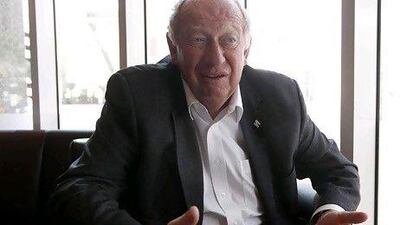Tim Hortons is a coffee, doughnut and sandwich chain with more than 3,000 locations in its native Canada, where it commands about 80 per cent of the poured-coffee market. But with just a handful of its locations now open in the UAE, "Timmy's", as Canucks call it, faces stiff competition in the Emirates.
Paul House, the company's executive chairman, and David Clanachan, its chief operations officer for international markets, discuss their efforts to win customers.
Q: More than a dozen billboards advertise Tim Hortons on the road between Dubai and Abu Dhabi. How much money are you putting into marketing here?
A: Mr Clanachan: Our partner, the Apparel Group, they're the master licensee for the area. Our agreement was to build 120 stores [in the Gulf] over the next five years, so they are doing quite a bit of marketing.
Q: Your shop on Sheikh Zayed Road is next door to Starbucks, and competing coffee shops are near four other locations that opened in Dubai and the capital on Wednesday. How are you trying to win over their customers?
A: Mr House: It's no different than at home. We compete against Starbucks, McDonald's and various players. This space became available; it was nothing to do with being next to Starbucks. Our food offering - our menu - gives us a competitive advantage because they're really not in the food business; they're in the beverage business. We're in both.
Q: Some shareholders fear you are focusing too much on Canadian expats here. Does Timmy's resonate with UAE locals and others?
A: Mr Clanachan: There's no doubt Canadians in the marketplace are very prideful of the brand. At the end of the day there might be 25,000 to 30,000 Canadians in the region, but the reality is we have to exist and succeed with people that are local residents. If you look around the restaurant, the multiculturalism that exists in Canada exists here too. Really, it's about what do you bring to the table.
Q: The company has come under fire in Canada for contributing to waste with its paper cups. Why did it take so long to respond?
A: Mr House: I would say it was more the local communities getting the right recycling programmes. It's wonderful to talk about recycling cups, but you have to have an infrastructure for that. We have an extensive programme in Atlantic Canada, where all of our cups are being recycled, made into cup holders and come back throughout the system. We're trying to implement that in every area we can.
QL And what are you doing to address environmental considerations in the UAE?
A: Mr Clanachan: We brought over the same format for eating in-restaurants that we have in Canada, which is using china - plates, mugs, so we're not creating excess packaging inside the restaurants … we'll just have to see how we're going to handle [recycling and other aspects].

